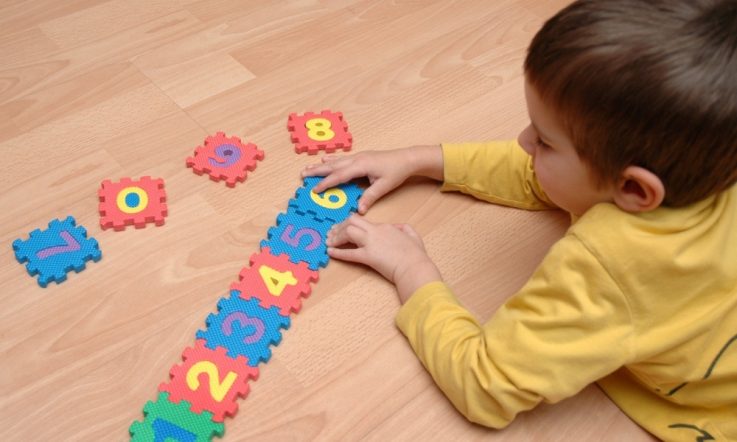When building basic number fluency in children, strategy choice is the key to effective practice, according to Monash University academic Sarah Hopkins.
A Senior Lecturer in the Faculty of Education, Hopkins has been working with individual case studies of children in Years 2-8, monitoring the strategies that they use as they practise solving simple addition problems every day for extended periods of time.
‘The approach I use allows me to investigate what factors actually lead to the discovery and use of more efficient strategies, including retrieval-based strategies – by that I mean direct retrieval, just knowing the answer and stating it – or using decomposition strategies, where students partition numbers to make use of the facts that they do know,' Hopkins says.
‘What I found is that this kind of research has highlighted just how much practice children need to become confident and accurate in using retrieval strategies.'
Hopkins says her research has also uncovered the many, varied reasons why children have difficulty learning from practice and the different types of sticking points that they experience. ‘For example, some children get stuck using an inefficient counting strategy like counting all, or they make the transition to min-counting where they count on from the larger addend but they forget which addend they start at, or they over count, or they forget to stop counting, or they under count so they make errors using miscounting strategies,' Hopkins explains. ‘Other children actually construct a faulty rule or a faulty decomposition strategy that they then practise. Or they can confuse double facts, so they might say 7+7 is 16 and 8+8 is 14, for example.'
Drawing together findings from the literature and the case studies she's monitored and analysed, Hopkins has found that strategy choice is an essential element of all children's mathematical experiences. ‘What I've found is the key to effective practice is allowing students to use whatever strategies they want to use and then encouraging them to know more than one strategy for solving a particular problem. So it seems that strategy choice is the most effective factor. Strategy choice is the key to effective practice,' she says.
Hopkins will be presenting on her research in greater detail at the Mathematical Association of Victoria's 54th Annual Conference (MAV17) in Melbourne in December.
Despite the body of research that has been conducted in this area, she says clear explanations of why children have difficulty with basic arithmetic are not forthcoming. ‘I think for a long time teachers have been encouraged to target children's individual difficulties with explicit instruction, but my findings highlight actually just how much teachers will need to know about the range of strategies a child uses and the types of errors they make if they are going to use explicit instruction effectively.
‘So, if they don't have a clear picture of where the child is at developmentally, explicit instruction could actually hinder a child's progress. For example, expecting a child to use a decomposition strategy when they don't know their doubles facts or their add-to-10 facts, could actually be counterproductive.'
Hopkins believes it's unrealistic for teachers to know this level of detail about a child's strategies and why they're making their errors, without spending all their time assisting individual children. ‘I think teachers are really caught up and now a lot of their time is spent assessing children rather than helping children to learn. I think we need an alternative approach and I think this approach is to provide plenty of opportunities for children to practise solving problems using strategies of their choice and allowing the child to decide on when they are ready to try out a new strategy.'
For those educators looking to help students move away from inefficient counting strategies, Hopkins has some advice. ‘We know some children will discover new strategies by themselves as they practise these problems, but other children benefit from being exposed to a range of strategies before practice,' she says. ‘So an effective way a teacher can do this is through whole class discussion, where children are asked to share how they solve a particular problem and then the teacher follows that explanation or modelling or representing each strategy to the rest of the class.'
However, she believes some children will need extra encouragement to try new or more efficient strategies whilst they're developing their skills. ‘Children can be more adventurous in the strategies they select if they can change the way the problem is represented. So, rather than using digits they might use dot patterns or spoken numbers or arrays. By increasing a child's understanding about how numbers work – like how they can be partitioned – that can encourage children to try new strategies.
‘And, even working on really challenging problems can encourage them to try different approaches. So teachers can target children's individual difficulties by experimenting with different approaches for different children to try and increase a child's confidence to try new strategies.'
Hopkins says a lot of the research in the past has focused particularly on low achieving children, and these children are referred to in the literature as having a learning disability if they are persistently low achieving.
‘While these children do have difficulty learning basic facts, the problem is much more widespread than this research actually indicates,' Hopkins shares.
‘So along with my colleague Donna Bayliss, we found that around 50 per cent of students in Year 7 were still counting to solve single addition problems (Hopkins & Bayliss, 2017). This is inconsistent with curriculum documents which suggest that by Year 3 students will predominantly use retrieval-based strategies.
‘This finding supports the argument that it's not just a few students who are having trouble using retrieval-based strategies when they are expected to do so, and the prevalence of this problem suggests that researchers need to stop looking for explanations that are based on cognitive deficit, which are thought to originate with the child, but focus more on understanding how teaching practices can contribute and even hinder children's development of basic number fact fluency.'
During her MAV presentation, Hopkins will show findings from different case studies to illustrate several points, including how problem-based practice leads to strategy discovery and the strengthening of retrieval-based strategies. She'll also explore why some errors are more problematic than others, how children react differently with corrective feedback, and how confidence with retrieval is built by applying trusted back-up strategies of choice.
She hopes delegates will walk away from her presentation at MAV17 with a clearer understanding of the importance of problem-based practice and also the pitfalls of other types of practice, such as strategy- and fact-based.
‘I hope to change the way people think about how to target children's individual difficulties, rather than thinking children need to be explicitly taught more efficient strategies, or that children's mistakes need to be constantly corrected,' she says.
‘I hope that more teachers will experiment with different ways to increase a child's confidence to try different strategies when solving problems. Confidence using a new strategy builds with experience and is reinforced using a trusted back-up strategy when children are allowed to choose the strategy they use during practice.'
References
Hopkins, S., & Bayliss, D. (2017). The prevalence and disadvantage of min-counting in seventh grade: problems with confidence and accuracy. Journal for Mathematical Thinking and Learning, 19(1), 19-32. doi: 10.1080/10986065.2017.1258613
The Mathematical Association of Victoria will hold its 54th Annual Conference (MAV17) in Melbourne on 7-8 December 2017. Visit the website for more information and to register.
Do you provide regular opportunities for students to practise their problem solving skills? Are they sometimes free to choose their own strategy, or a back-up, rather than focus on a particular strategy being taught?



